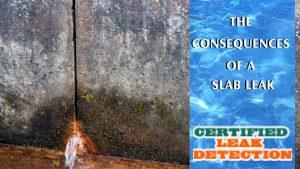
How often do you think about the foundation of your house? Probably not often, if at all. While we at Certified Leak Detection aren’t trying to give you another worry to keep you up at night, being aware of the signs and consequences of a slab leak should be on your radar. We want you to have the knowledge to prevent the extensive damage that results from a slab leak that goes undetected and unrepaired for too long.
As we covered in our July 2019 blog post – “What Are the Common Signs of Slab Leaks?” – a slab leak is a pipe leak under the concrete foundation of a home, either in the cold water or hot water lines. About 80% of slab leaks occur in the hot water lines. Insidious and expensive to repair, a slab leak can easily progress undetected to the point of damaging the foundation, floors, carpeting and walls – as well as setting up conditions for the growth of dangerous mold.
Slab leaks lead to trouble inside the home
An unexplained increase in your water bill may be the first evidence of a slab leak. This is the time to look for other signs to avoid – or reduce the extent of – the following types of damage that can occur.
It can ruin your flooring and carpeting – When water starts seeping from below your house, it can only move up, saturating flooring. This causes wood flooring to warp and buckle, tile flooring to crack and carpeting (and its foam padding) to soak through, creating a conducive environment for the afore-mentioned mold.
Foul odors – A slab leak that is left unrepaired will eventually lead to moldy or musty odors spreading throughout your home. You may not be able to see the mold, but it’s there (continue reading)! Also, any leaks that originate from your property’s sewer lines will lead to the house smelling like sewage.
Mold growth – When the water seeps into your house from the foundation, it starts getting absorbed by drywall and wood. Wet drywall is the perfect setting for mold to grow inside your house. In addition to being unsightly, mold is difficult to eliminate – which typically necessitates hiring a mitigation professional or replacing the affected drywall. Foremost, mold is a serious health hazard – especially for the elderly and those with respiratory problems.
Impact of slab leaks on your foundation
Apart from the damage inside your home, a slab leak can also cause extensive outdoor damage to your property. Slab leaks can damage your home’s foundation. It weakens your structure that can cause your foundation to shift, move, or crack. Also, a slab leak can ruin your yard
Let us now look at the impact slab leaks can have on your foundation
Florida homes are built with one of two types of foundation – poured concrete slab and pier-and-beam. Most newer construction uses concrete slab because it is faster to pour and more economical. Concrete slab foundations are formed using concrete and reinforced rods in order to lay a home’s foundation flat against the ground. Plumbing and electrical lines are put in place before the slab is poured.
Generally, copper pipes are used in plumbing. If the chlorine content is high in your area, your pipes can develop pinhole leaks. Regardless of the type of pipe used, the location of the pipes make it difficult to know about leaks in the early stages – and even more difficult to locate the leak and replace the pipe.
There are various ways of detecting a slab leak on your property. Hearing the sound of running water even after turning off all faucets is a good indicator of a slab leak – as is a water meter that continues to run after you’ve done so. Also, a patch of grass that is greener and more lush than the rest of the lawn is another sign – assuming it isn’t growing above the septic tank, which is a sign of a different issue!
Now that the scene has been set, slab leaks steadily undermine your home’s foundation, which the foundation experts at PermaPier explain as follows:
“Because a slab “floats” on top of the soil, as water erodes the soil out from under the slab, it may cause your foundation to weaken, crack, and in very extreme cases, collapse. As seasons change, moisture inside small cracks and crevices in the slab will expand or contract, causing increase breakage in the concrete, further weakening the overall strength of the foundation.
“Once a foundation has begun to move or shift, the structural integrity of the entire building is put at risk. Homeowners may begin to notice cracks developing in walls. Window glass may break for no apparent reason. Floors that once lay flat may begin to buckle. And, of course, because of the presence of water in the living environment, residents may notice the development of mold and fungi.”
While no one wants to believe the cause of such adverse conditions is a slab leak – considering their expense to repair – ignoring it only leads to greater damage that’s even more costly to repair, not to mention the increased risk to health if mold is involved. Your homeowners insurance may cover part of the cost, but read your policy and ask your insurance agent to be certain you understand the terms of your coverage.
Again, early detection is key to limiting damage. Should you suspect trouble, Certified Leak Detection is experienced in leak detection and repair for Orlando, Longwood, Lake Mary, Sanford, Kissimmee, Clermont and Winter Springs. Trusted by homeowners and business owners throughout Central Florida, our team is ready to answer your call. Contact us for quick, reliable service.

